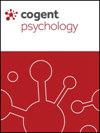Expanding the Theory of Planned Behavior to Explain Energy Dense Food Intentions among Early Adolescents in Indonesia
IF 1.6
Q2 PSYCHOLOGY, MULTIDISCIPLINARY
引用次数: 1
Abstract
Abstract The aim of this study is to examine an extended model of the Theory of Planned Behavior (TPB) and increase insight into the intentions to consume energy-dense food among adolescents in Indonesia. This study included 411 adolescents from private schools who reported their intentions to consume energy-dense food the next day and the next week, as well as attitudes, subjective norms, descriptive norms, and perceived behavioral control regarding energy-dense food consumption. Linear regression analyses (in R) were conducted to examine associations of TPB determinants (model 1), TPB determinants plus descriptive norms (model 2), and interactions between determinants (model 3) with the intention to consume energy-dense food the (1) next day or (2) next week. Attitudes and subjective norms were positively associated with both the ‘next day’ and ‘next week’ energy-dense food intentions (model 1), although associations for the ‘next day model’ appeared to be stronger. Descriptive norms, compared to subjective norms, were more strongly associated with ‘next week intentions’, whereas both norms (descriptive and subjective) did not differ in how strongly they were associated with ‘next day’ intentions (model 2). Significant interactions between TPB constructs were found for the model predicting ‘next day’ intentions (i.e. subjective norms × attitude and attitude × PBC) (model 3). Our study provides important information about proximal food intentions among collectivistic cultures specifically, which may have crucial implications for future preventive interventions.扩展计划行为理论解释印尼早期青少年能量密集型食物意向
本文章由计算机程序翻译,如有差异,请以英文原文为准。
求助全文
约1分钟内获得全文
求助全文
来源期刊

Cogent Psychology
PSYCHOLOGY, MULTIDISCIPLINARY-
CiteScore
2.90
自引率
0.00%
发文量
75
审稿时长
12 weeks
期刊介绍:
One of the largest multidisciplinary open access journals serving the psychology community, Cogent Psychology provides a home for scientifically sound peer-reviewed research. Part of Taylor & Francis / Routledge, the journal provides authors with fast peer review and publication and, through open access publishing, endeavours to help authors share their knowledge with the world. Cogent Psychology particularly encourages interdisciplinary studies and also accepts replication studies and negative results. Cogent Psychology covers a broad range of topics and welcomes submissions in all areas of psychology, ranging from social psychology to neuroscience, and everything in between. Led by Editor-in-Chief Professor Peter Walla of Webster Private University, Austria, and supported by an expert editorial team from institutions across the globe, Cogent Psychology provides our authors with comprehensive and quality peer review. Rather than accepting manuscripts based on their level of importance or impact, editors assess manuscripts objectively, accepting valid, scientific research with sound rigorous methodology. Article-level metrics let the research speak for itself.
 求助内容:
求助内容: 应助结果提醒方式:
应助结果提醒方式:


